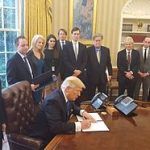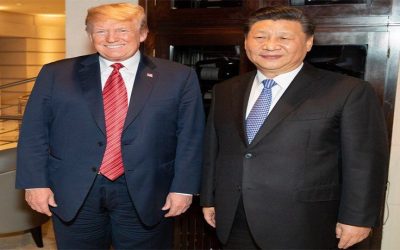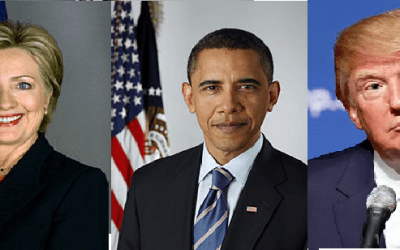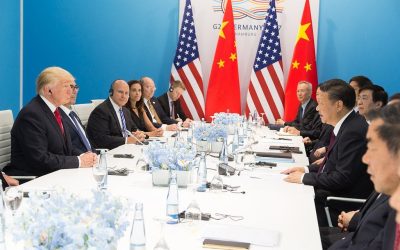But it is important to understand that the two issues of the objective economic situation and the interest in the analyses of Xi Jinping are not separate. The increasing role of China in global ‘thought leadership’ results from the fact that its current analysis and policies systematically respond to interrelated issues of China’s domestic economic situation and global economic developments. This also clarifies why key Chinese programmes such as One Belt One Road (B&R) are not ‘one-off’ initiatives but form part of an integrated perspective. It is therefore useful to step back from individual policies and look in the most general terms at the new situation reflected in China’s global ‘thought leadership.’ This is the goal of this article.
The situation following the international financial crisis
The situation facing China since the international financial crisis, and therefore during the period of the Presidency of Xi Jinping, differs in crucial aspects from previous periods of development of the People’s Republic of China (PRC) and therefore from that confronting previous Chinese leaders of the PRC. Regarding the international aspect of this, and given there may be shock at the reality of global trends, a non-Chinese source will be used here to establish these- IMF projections accompanying its latest World Economic Outlook. The interrelation of two realities, domestic Chinese and international, define the features of this new period during Xi Jinping’s Presidency. The conclusion flowing from their interrelation explains why Deng Xiaoping’s dictum ‘hide brilliance, cherish obscurity’ has been modified, due to the new objective situation, to instead showing the objectively great importance of explaining China’s position to a global audience.
- Domestically, China is in transition within five years to its own criterion of ‘moderate prosperity’ and within a decade to the World Bank’s definition of a ‘high income economy’. Attaining the latter in a single stroke would double the number of those living in such countries – a transformation of the global economy.
- Internationally, China’s 2016 chairmanship of the G20 confirmed it hopes for, and plays a role in aiding, growth in advanced economies. But China cannot depend on any guarantee of Western growth – indeed IMF data projects that following the international financial crisis advanced economies face prolonged average growth slower than after the Great Depression started in 1929.
Given slow global economic development makes it harder for China to achieve its target of a high-income economy China must therefore pro-actively take not only domestic initiatives but aid world growth – hence policies such as B&R and the significance of explaining China’s analyses globally.
The ‘Great Stagnation’
Analysing first the international dimension of the present situation, the term ‘Great Recession’ is primarily used referring to events after 2008. But several analysts have gone further – Larry Summers, former US Treasury Secretary, speaking of ‘secular stagnation’ and the IMF Managing Director Christine Lagarde talking of ‘new mediocre’. Nevertheless, it may still come as a shock to realise that IMF economic projections imply that the common phrase Western that economies face the deepest economic problems since the Great Depression in one crucial aspect understates the situation.
IMF projections show that by the end of 2017 the total 12 per cent growth in advanced economies after 2007 will be slower than the 15 per cent in the decade after 1929. Strikingly, by 2021, fourteen years after 2007, total growth in advanced economies will be less than half that in the 14 years after 1929 – 21 per cent compared to 50 per cent after 1929.
It is not possible for the US, or for similar reasons the other advanced economies, to break out of this slow growth for reasons analysed in my book The Great Chess Game (一盘大棋? ——中国新命运解析).
Decisive role of B&R
As relative stagnation in the Western economies will be not be accompanied by corresponding trends in Asia a striking transformation of the world economy is projected in the next half decade which makes graphically clear the role both of China and of the development of the ‘B&R region’. A detailed analysis of this was given in my article ‘Why the ‘Belt & Road’ region will be the main locomotive of the world economy‘ so only the chief results will be summarised here.
Taking a ‘core’ definition of China’s B&R region (developing Asia, East Asia excluding Japan, former USSR excluding the Baltic States, Iran, Iraq, Turkey):
- At current exchange rates projections from IMF data show in 2016-2021 the B&R region accounting for 45 per cent of global growth – compared to North America’s 24 per cent and the EU’s 10 per cent.
- In purchasing power parities (PPPs) the B&R region would account for 57 per cent of world growth – compared to North America’s 14 per cent and the EU’s 11 per cent.
By 2021 at current exchange rates B&R region’s GDP will be 31 per cent of world GDP – compared to North America’s 27 per cent and the EUs 19 per cent. In PPPs, the respective proportions will be 47 per cent, 18 per cent, and EU 15 per cent.
World economic growth consequently more depends on the B&R region’s success than on North America or the EU and China’s role in the B&R regions growth will be decisive.
Analysis by Xi Jinping
Xi Jinping therefore faces a fundamentally different situation to previous Chinese leaders.
The analyses of Mao Zedong and Deng Xiaoping were, of course, of great impact internationally. But this was due to the primarily geopolitical, not economic, impact of China.
- In 1949 only approximately 10 countries had a lower per capita GDP than the China Mao took leadership of. China in the ‘pre-reform’ period of Mao Zedong made the greatest social advances in a major country in world history. In the 27 years between the establishment of the People’s Republic of China in 1949, and the death of Mao Zedong in 1976, life expectancy in China increasing by 31 years, or over a year per chronological year – the fastest rate ever experienced in a major country. ‘Maoism’ raised China’s life expectancy from 73 per cent of the world average in 1949/50 to 105 per cent in 1976, Important foundations of industrialisation were also laid. But overall China’s 4.9 per cent annual average GDP growth in 1950-78 was only slightly above the world average 4.6 per cent.
- China’s leaders from Deng Xiaoping until the international financial crisis produced rapid growth. In 1978-2007 China’s annual average GDP growth rate was 9.9 per cent, achieving the transition from a ‘low income’ to an ‘upper middle income’ economy by international classification. In this period China benefitted from relatively rapid 2.8 per cent annual advanced economy growth. Therefore, in both the ‘Mao Zedong period’ and the ‘Deng Xiaoping’ period the Western economies were themselves undergoing relatively rapid growth – which continued until the 2008 international financial crisis.
This international situation changed fundamentally in 2008.
Impact of China’s international initiatives
Xi Jinping is the first Chinese leader facing a simultaneous combination of China’s transition to a high-income economy with very low Western growth. This is therefore the new combination of international and domestic factors analysed by Xi Jinping. It is for this reason that objectively this represents a new period in the development of analysis in China after the earlier phase of development of Mao Zedong and Deng Xiaoping.
The great international impact of Xi Jinping’s analysis, as shown in events leading to the G20 summit, therefore reflects this combination of ‘objective’ and ‘thought leadership’ factors.
- Objectively China has come through the protracted period since the international financial crisis with far more rapid development than any other major economy and is clearly successfully making the transition to a ‘high income’ economy by international standards.
- In terms of ‘thought leadership’ China, as highlighted in Xi Jinping’s speeches at Davos and the Beijing B&R summit, has responded to the ‘Great Stagnation’ in the Western economies not only with precise policy initiatives, such as B&R and AIIB, but with clear analyses of globalisation and present global economic problems. It is for these reasons that distinctive concepts such as ‘community of common destiny’ which underpin China’s approach have had their impact in forming policy, and why there is international interest in China’s analysis as shown in preparation of the G20 summit.
Put in terms of the objective processes Martin Wolf, chief economics commentator of the Financial Times, and one of the West’s most influential journalists, stated bluntly at the end of May that the question now being discussed in all countries was: ‘Would it not be wiser, they wonder, to move closer to China?’ In terms of ‘thought leadership’ Ian Bremmer, President of the Eurasia Group, the most influential Western ‘risk analysis’ company, noted regarding one of the key indicators of China’s success in projecting not only practical power but also ideas: ‘Davos reaction to Xi speech: Success on all counts.’
Therefore, to return to the point at the beginning of this article, the speeches of Xi Jinping have attracted great international attention in 2017 not only because of the objective economic impact of China but because the concepts developed during the new phase of Chinese analysis have corresponded to the new situation of both the international and Chinese economies.






